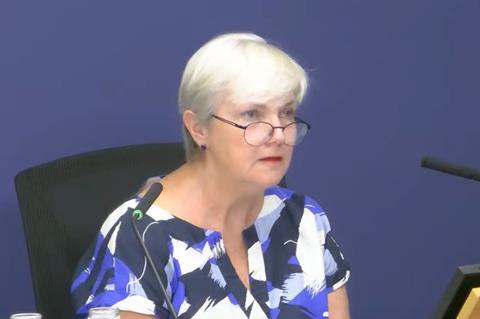A former in-house solicitor with the Post Office has denied she was part of a cover-up to prevent the public finding out the Horizon IT system was flawed.
Mandy Talbot, giving evidence to the Post Office Inquiry today, said she had ‘absolutely nothing to hide’ during the period when civil proceedings were brought against sub-postmasters in the early 2000s.
The inquiry has previously heard that Talbot was said to have wanted to ‘throw money’ at keeping problems with the Horizon IT system out of court, and to have suggested it was worth asking one complainant ‘how much to go away and keep your mouth shut?’.
Talbot today said this tone ‘doesn’t really sound like me’ and that ‘I don’t really think I would express myself in those terms’.
She continued: ‘I had absolutely no desire to hide what had happened in this case… if it had gone into court at that time it might well have had an impact upon Post Office Limited and [Horizon designer] Fujitsu, but so be it.’
Asked by inquiry counsel Julian Blake whether she had ‘absolutely anything’ to hide, she responded ‘no’. Blake asked if she had wanted to hide Fujitsu-related issues from the public, to which she again replied: ‘No.’
The inquiry heard that Talbot, who joined the Post Office in 1990, was part of a ‘decimated’ team of lawyers following a redundancy process in the early 2000s. She had one hour’s training in the working of Horizon and had the ‘distinct impression it was the perfect system’. She submitted that she only started having doubts about the system in 2010 and that before then she had been assured it was ‘robust and fit for purpose’.

In 2003, jointly instructed IT expert Jason Coyne had reported defects with Horizon as part of civil proceedings against Julie Wolstenholme, who ran the Cleveleys branch in Lancashire. It was this case in which Talbot was said to have advised that Wolstenholme should be paid off.
Talbot said she was ‘not at all worried’ by this report, which she stressed was not a final document, and she was reassured by Fujitsu having invited Coyne to visit its headquarters.
Asked by Blake whether it was by then dawning on her that the Horizon system was not infallible, Talbot said: ‘I can categorically say no.’
The inquiry moved on to talk about another civil case involving Lee Castleton, who was pursued by Post Office for £25,000 apparently missing from his branch.
Talbot repeatedly stated that the case was so important because of the size of Castleton’s counter-claim (it was purported at one stage to be worth £250,000, although Post Office counsel conceded it would much lower).
Talbot said the claim ‘morphed’ into a test case to show the reliability of Horizon, although she at no point brought up the previous problems reported during the Wolstenholme proceedings, saying these were ‘not relevant’.
She added: ‘I believe Post Office felt the need to demonstrate it would take a firm line with any and all challenges to Horizon.’
Talbot was shown documents from the time where it was explained to her that the case against Castleton was incurring ‘disproportionate costs’ but she denied that she had ‘lost sight’ of what the litigation was about.
The inquiry heard that Talbot was said to have expressed the view that if the Post Office was seen to compromise on Castleton that ‘the whole system will come crashing down’ and this would ‘egg on’ other sub-postmasters to issue speculative claims.
Talbot had written in one email at the time that a judgment against Castleton would be ‘of tremendous use in convincing other postmasters to think twice about their allegations’.
The hearing continues.






























